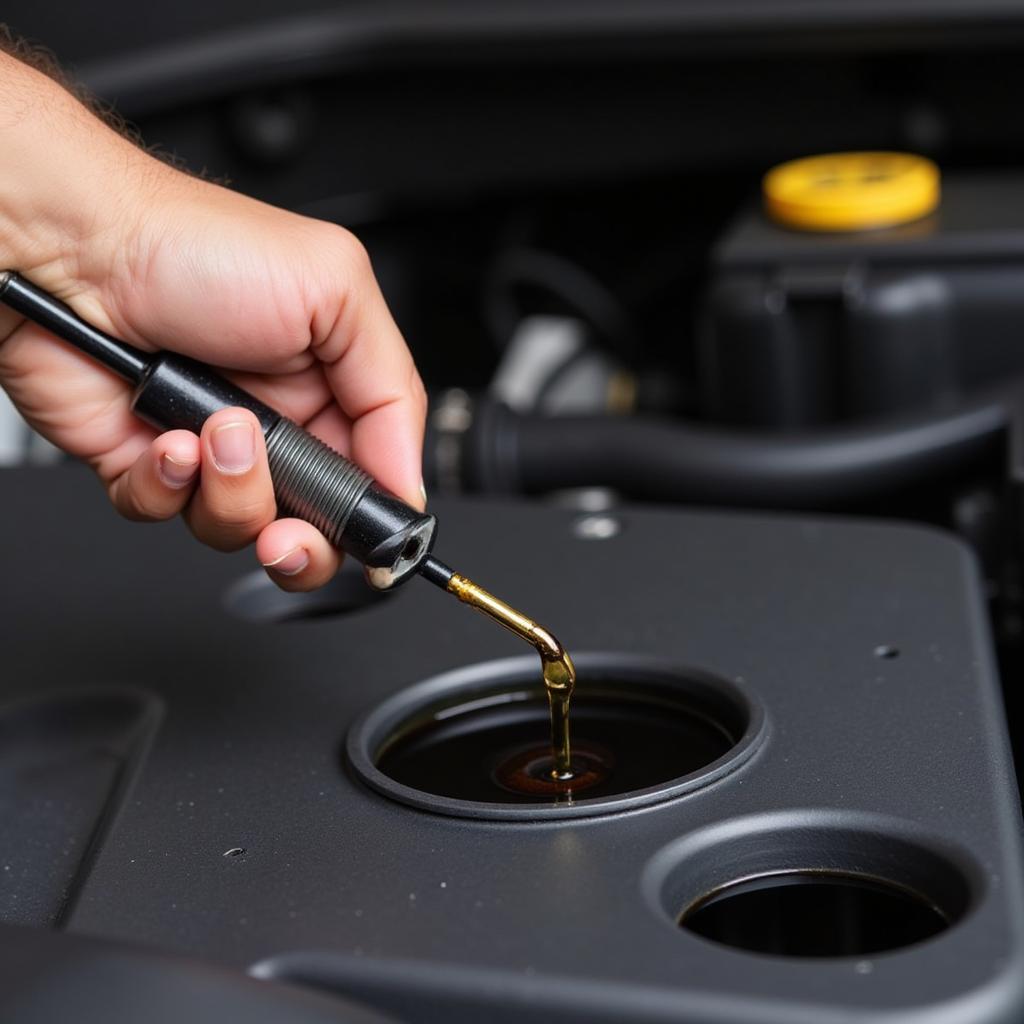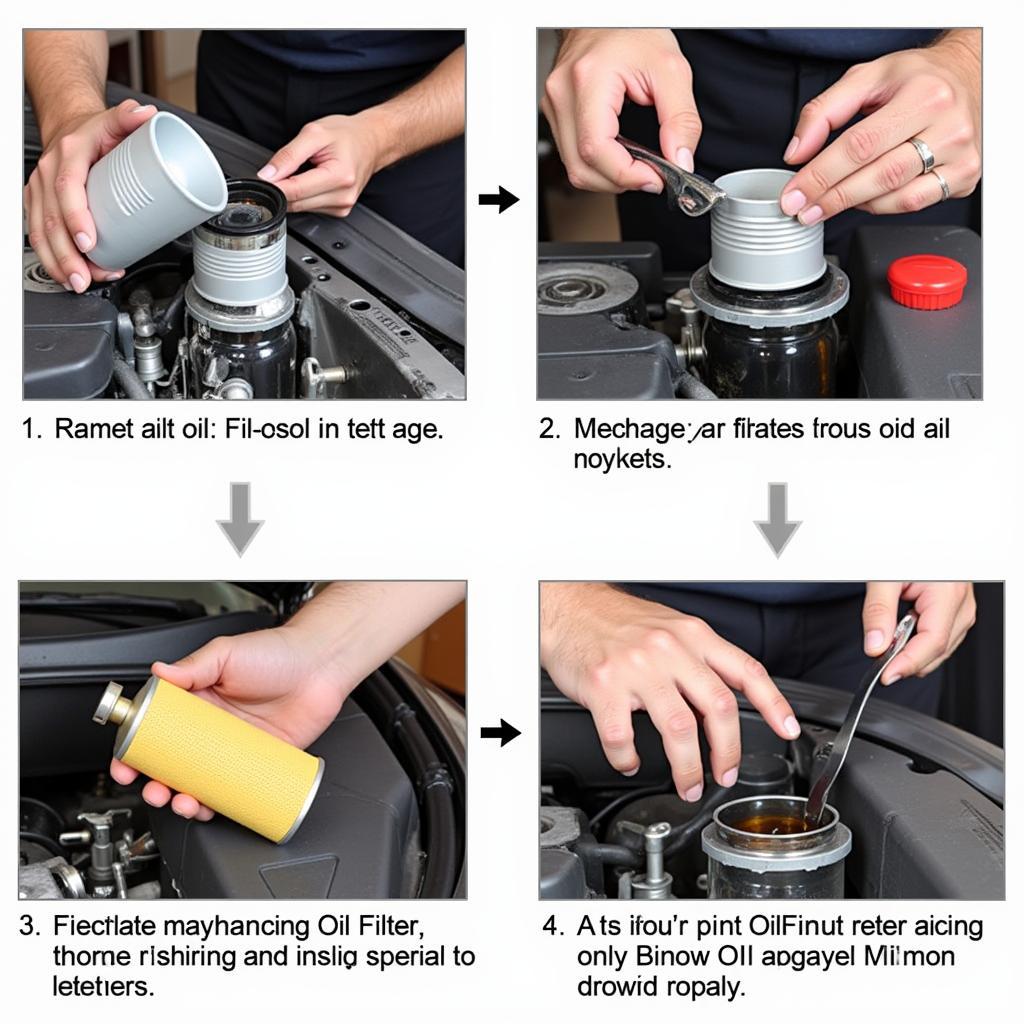Car Maintenance Oil Change is a cornerstone of vehicle health and longevity. Regular oil changes are crucial for keeping your engine running smoothly and preventing costly repairs down the road. This guide will provide you with everything you need to know about oil changes, from understanding why they’re important to choosing the right oil and even performing a DIY oil change.
Knowing when and how to change your car’s oil is essential for every car owner. Understanding this crucial aspect of car maintenance can save you money and extend the life of your engine. Want to keep track of your maintenance schedule effortlessly? Check out these best car maintenance reminder apps.
Why Are Car Maintenance Oil Changes So Important?
Your engine is a complex machine with many moving parts. Oil lubricates these parts, reducing friction and preventing wear and tear. Over time, oil breaks down, becoming less effective at lubrication and accumulating contaminants. Regular car maintenance oil changes ensure fresh, clean oil is circulating, protecting your engine and maximizing its performance.
Signs You Need a Car Maintenance Oil Change
While sticking to a regular schedule is best, there are signs your car might need an oil change sooner than expected. These include:
- Dark, dirty oil: Check your oil dipstick. If the oil is dark and gritty, it’s time for a change.
- Low oil level: Low oil can cause serious engine damage. Top it off and schedule an oil change soon.
- Knocking or ticking sounds: These noises can indicate inadequate lubrication due to old or low oil.
- Excessive exhaust smoke: Blue or gray smoke from your exhaust can be a sign of burning oil.
- Check engine light: While this light can signal many issues, it can also indicate oil-related problems.
 Checking Car Engine Oil with Dipstick
Checking Car Engine Oil with Dipstick
Choosing the Right Oil for Your Car
Not all oils are created equal. Your car’s owner’s manual specifies the recommended oil type and viscosity. Using the incorrect oil can negatively impact your engine’s performance and lifespan. Common oil types include conventional, synthetic blend, and full synthetic. Each has its benefits and drawbacks, and understanding the differences is crucial for proper car maintenance oil changes.
Understanding Oil Viscosity
Oil viscosity refers to its thickness. A higher viscosity number indicates thicker oil. The correct viscosity depends on your car’s make, model, and operating conditions. Using the wrong viscosity can lead to decreased fuel efficiency and increased engine wear. For DIY enthusiasts, it’s crucial to select the appropriate oil filter. Learn more about DIY car maintenance ratchet oil filters.
How Often Should You Change Your Oil?
Traditionally, the “3,000 miles or 3 months” rule was the standard for car maintenance oil changes. However, modern vehicles and advancements in oil technology have extended this interval. Many manufacturers now recommend oil changes every 5,000-7,500 miles or 6-12 months. Consult your owner’s manual for the specific recommendations for your car.
DIY Car Maintenance Oil Change: A Step-by-Step Guide
If you’re mechanically inclined, a DIY car maintenance oil change can save you money. Here’s a simplified guide:
- Gather your supplies: Oil, oil filter, wrench, drain pan, funnel, and new oil filter.
- Warm up the engine: Run the engine for a few minutes to warm the oil, making it flow easier.
- Locate the drain plug: Consult your owner’s manual for the location.
- Drain the old oil: Place the drain pan under the drain plug and carefully remove the plug.
- Replace the oil filter: Remove the old filter and install the new one.
- Replace the drain plug: Tighten the drain plug securely.
- Add new oil: Consult your owner’s manual for the correct amount.
- Check the oil level: Use the dipstick to ensure the oil level is correct.
 Do-It-Yourself Car Oil Change
Do-It-Yourself Car Oil Change
Want to know more about performing your own oil change? Check out this guide on DIY car maintenance: how to change oil yourself for the family.
Car Maintenance Oil Change Costs
The cost of a professional car maintenance oil change varies depending on your location, the type of oil used, and the service provider. Synthetic oil changes are generally more expensive than conventional oil changes. Factor in the cost of the oil filter and any additional services, such as a tire rotation or fluid top-off. Curious about potential tax deductions? Learn more about oil changes and car maintenance deductions.
“Regular oil changes are like vitamins for your engine. They’re essential for long-term health and performance,” says John Davis, a certified automotive technician with over 20 years of experience.
Keeping Track of Your Car Maintenance Oil Changes
Maintaining records of your car maintenance oil changes is crucial for warranty purposes and resale value. Use a notebook, spreadsheet, or one of the many available car maintenance reminder apps to track your service history. Staying organized can save you headaches down the road. Are you searching for helpful apps to remind you about car maintenance? Check out some suggestions here.
“A well-maintained car is a happy car,” says Sarah Miller, a seasoned mechanic and car enthusiast. “Don’t neglect your oil changes; they’re a small investment with big returns.”
Conclusion
Car maintenance oil changes are a fundamental aspect of car ownership. They are vital for engine health, performance, and longevity. By understanding the importance of oil changes, choosing the right oil, and sticking to a regular maintenance schedule, you can keep your car running smoothly for years to come. Need assistance with your car maintenance? Contact AutoTipPro at +1 (641) 206-8880 or visit our office at 500 N St Mary’s St, San Antonio, TX 78205, United States.
FAQ
- How do I check my oil level? Use the dipstick located in your engine compartment.
- What happens if I don’t change my oil? Engine damage, decreased performance, and reduced fuel efficiency.
- Can I mix different types of oil? It’s not recommended. Stick to the type specified in your owner’s manual.
- How much does an oil change cost? Prices vary, but typically range from $30 to $100.
- How long does an oil change take? Around 30-45 minutes for a professional service.
- What is synthetic oil? A man-made oil designed for superior performance and longevity.
- How do I dispose of used oil? Take it to a designated recycling center or auto parts store.






Leave a Reply